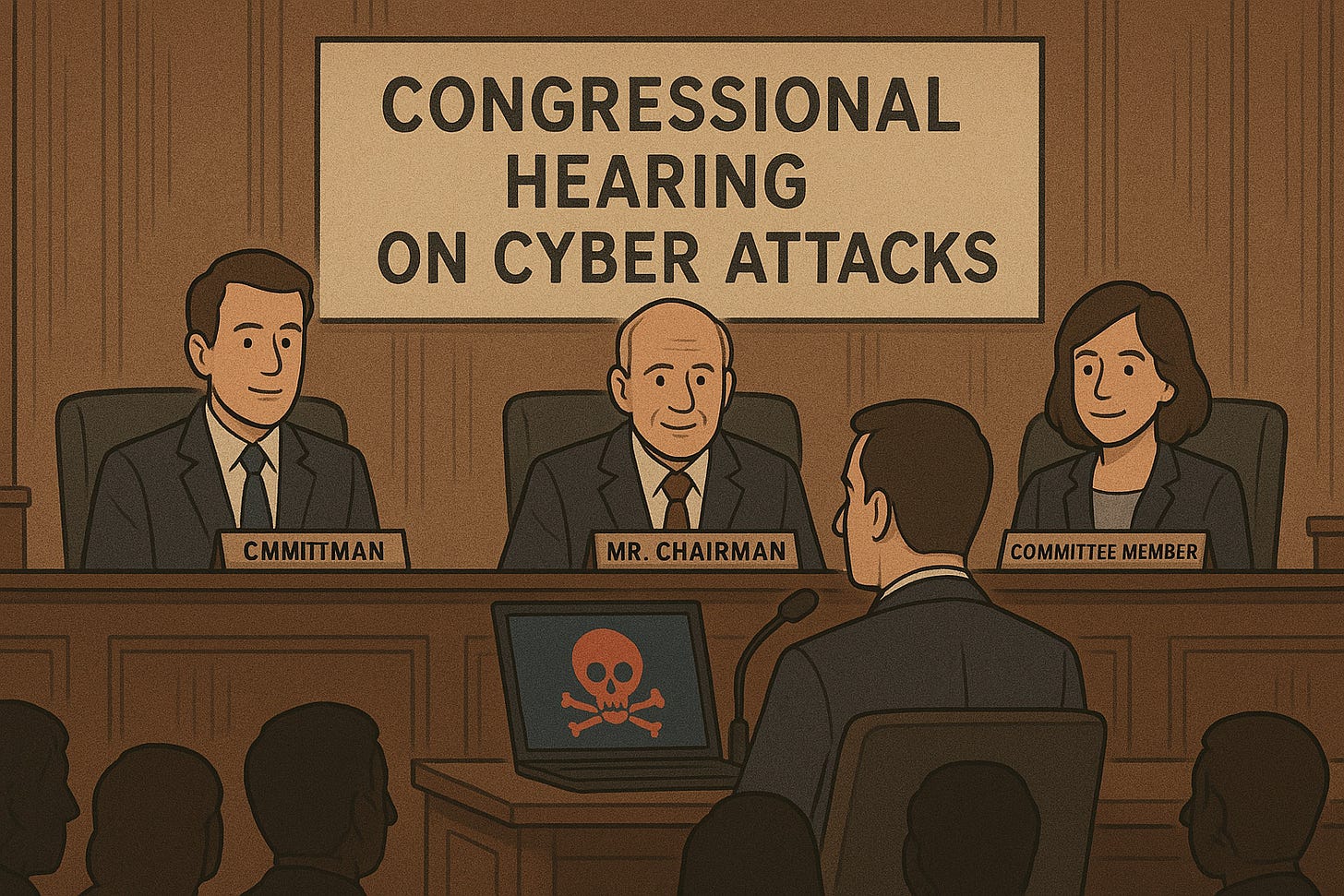John McGuire has good questions on cyber attacks
Plus: Budget cuts are already hurting Shenandoah National Park.

This week, the House’s subcommittee on cybersecurity—which Rep. McGuire sits on—had a two-hour hearing about China’s cyber attacks on the U.S. and other countries. Hackers got metadata about the phone calls and text messages of millions of Americans, found information on government wiretaps, and reportedly obtained recordings from phones used by Donald Trump, J.D. Vance, and the staff of Kamala Harris’ presidential campaign.
These attacks—broadly known as Salt Typhoon—are exactly the kind of thing Congress should be investigating, and kudos to Rep. McGuire for joining what appears to be a sparsely attended hearing.
I don’t have the fortitude to watch the entire hearing, but I did watch McGuire’s five minutes. He asks the three panelists good questions about information sharing and deterring future attacks. But two things quickly become clear:
in time-honored congressional tradition, he spends at least as much time placing blame (on Biden, in this case) as on what Congress can do, and
he consistently directs his questions to the wrong panelist.
Question 1
McGuire, to Panelist #1: “Are there any federal laws or regulatory red tape that prevents or hampers information-sharing about hacks between government agencies and the telecommunications industry?”
Good question! We don’t want barriers to information-sharing. But note how he’s leading the witness by introducing the idea of red tape. The man’s got a hammer, and he’s looking for nails.
Panelist #1: “Thank you, congressman. I would defer to [Panelist #2’s] experience being the former chief information officer at AT&T around specific, granular challenges around information sharing….”
Translation: “Ask Panelist #2, who knows something about that.”
Question 2
McGuire, to Panelist #2: “The 2023 national security strategy… largely omits deterrence. In your view, why was deterrence overlooked and how important do you think it is to incorporate it into the strategy?”
It’s smart to ask how we can step up deterrence. But McGuire has changed the subject, ignoring Panelist #1’s advice to ask this guy about information-sharing.
Panelist #2: “It came up earlier [in the hearing], this question of deterrence. Certainly it helps. I’m not an operator, so I’m not the one doing the deterrence. But if someone’s doing it, it’s going to help. Your point about information-sharing is an important one…”
Translation: “Should’ve asked me about information-sharing, like the last guy said.” He goes on to say that they’ve been talking about information-sharing for 30 years and it hasn’t made a difference—undercutting the premise of McGuire’s previous question.
Question 3
McGuire, again to Panelist #2: “How would you propose the U.S. increase the cost on China to deter their cyber operations, especially when they seem to act with impunity under the current framework?”
Panelist #2: “Obviously, deterrence can be done in any number of ways. Not really my area of specialization.”
Translation: “Don’t ask me.” (He goes on to say that the best deterrence is to have the best defense—again challenging the premise of McGuire’s question.)
Question 4
McGuire, again to Panelist #2: “Under the Biden administration, [a certain government agency] diverted resources to collude with social media companies to surveil and censor American citizens. Would you agree with that?”
Panelist #2: “I don’t know anything about that. The others might know something.”
Panelist #1: “Yeah, that’s my understanding, sir.”
Panelist #3, finally invited to speak: “I have no idea how the resources were allocated.”
Question 5
McGuire to all panelists: “Where would you go to become a subject-matter expert to help President Trump and the America First agenda to protect us from China and other adversaries?”
Good question! No notes. (Other than how obsequious he is to Trump, but that’s perfectly on-brand for McGuire.)
The panelists mention the Sans Institute as well as college classes taught by their colleagues. McGuire acknowledges a few Georgetown students who are attending the hearing and wraps up his time.
Budget cuts are hurting Shenandoah National Park
Over at the excellent Charlottesville Community Engagement, Sean Tubbs explains how federal budget cuts have already required staffing cuts at Shenandoah—some of which is in VA-5—and caused all kinds of confusion there. Link below the excerpt:
The SNP Trust now offers information about how the park has been affected by cuts made by the White House. A total of fifteen probationary employees were let go, according to the page. These positions included maintenance, sanitation, and other operational roles such as collecting fees from visitors.
The last update is from March 26 and reminds readers that Congress passed a Continuing Resolution to keep the federal government operating which seeks to reduce nondefense spending by $15 billion in FY2025.
“At this time, we don’t know how these cuts will impact Shenandoah National Park,” reads a portion of the SNP trust website on the effects of the federal cuts.
A February 27 memo from the Office of Personnel Management called for reductions in staff and leadership at the National Park Service have to submit a list of filled and unfilled positions by April 25.
Adding confusion to the matter is that the Trump administration was ordered by federal Judge William Alsup on March 13 to reinstate probationary employees who had been fired en masse. A lower court judge in Maryland agreed and issued orders to reinstate employees at 18 federal agencies.
To stay up to date, visit the website yourself.
Let Rep. McGuire know what you think
Call: (202) 225-4711 (DC office)
(434) 791-2596 (Lynchburg district office)




McGuire has competent staff, that's why he can ask good questions.
Thank you for providing this information. I call McGuire every week day to express my dissatisfaction with his subservience to DJT and to demand a town hall.